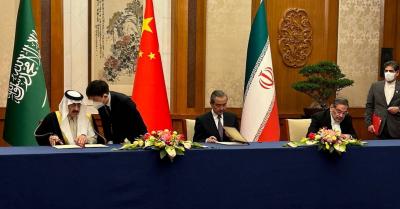Political forces continue to explore the implications of the Saudi-Iranian agreement on Lebanon. The so-called March 8 forces are trying to push their candidate, Suleiman Franjieh, by suggesting that the agreement favors them, while the opposition is uniting its ranks to confront the option of dragging Lebanon into an additional six years of open crisis both internally and externally and is striving to agree on a candidate who is free from the taint of polarization.
There is a third, significant opinion expressed by a national figure in constant communication with decision-making capitals, who regularly meets with ambassadors from countries concerned with Lebanon’s issue, especially ambassadors from the International Support Group for Lebanon. This source provides "Nidaa Al-Watan" with insights gained from off-the-record meetings, which clearly indicate that "in the presidential file, there is no place for a compromised president, and the outside world views this election as the key to either relief or further isolation."
This figure confirms that regarding the Saudi-Iranian agreement in its Lebanese context, "the position announced by Saudi Foreign Minister Faisal bin Farhan seemed the most realistic and consistent with practical proposals to exit the deadlock of the vacant presidency, considering that Lebanon needs a Lebanese-Lebanese rapprochement, not a Saudi-Iranian rapprochement. Its leaders must prioritize the national interest above any other interest or consideration. Thus, the regional agreement between its Saudi and Iranian sides, which is undergoing a trust-building phase, can be seen as a contributing factor in finding a solution to the political crisis in Lebanon as an entry point for solving economic, financial, and social crises and rearranging its relationships with brotherly and friendly countries, while the first and last decisions in selecting the appropriate president must remain in the hands of Lebanese factions, without overlooking the existence of Saudi partnership in the decision as it will entail subsequent requirements, alongside the Iranian factor."
He emphasizes that "the Saudi-Iranian relations are facing two decisive and critical months to build trust and proceed with restoring diplomatic relations and implementing agreements of a political, economic, and cultural nature, prioritizing the Yemeni file, thus focusing on the need to end the war and assist Yemenis in pursuing negotiations aimed at reaching an agreement that results in forming a transitional government, conducting legislative elections, and reconstructing power in partnership with all components of the Yemeni spectrum without exception. Riyadh must commit to providing all necessary assistance to the new Yemeni government to alleviate the effects of the war and start reconstruction, rehabilitating infrastructure, and injecting the necessary funds to achieve that, notably the Iranian response to the priority of ceasing the war and working towards the release of all prisoners as a fundamental first step while lifting the imposed siege on Yemen concurrently with the withdrawal of all foreign forces from all Yemeni territories."
The source pointed out to "Nidaa Al-Watan" that "the announcement of the Saudi-Iranian agreement stems from the necessity for both countries, as the Saudi will is to end this file in response to Crown Prince Mohammed bin Salman’s vision of transitioning Saudi Arabia from an old path to a new era of development. Moreover, the implementation of the 'NEOM' project requires providing all stability and public peace factors to encourage more investments flowing heavily into Saudi Arabia. Meanwhile, Iran is very enthusiastic about ending the rift with the Kingdom and entering a partnership in regional security, which has been a chronic Iranian demand, providing it with more confidence and support to advance its nuclear negotiations. Furthermore, the agreement has made Syria's return to occupy its seat in the Arab League and participate in the upcoming Riyadh summit almost assured."
The source revealed that "what Riyadh seeks in the Yemen and Bahrain files has been achieved within the agreement's provisions, specifically regarding the security of energy corridors and the initiation of eliminating any presence of terrorist organizations spread in Yemen that pose a threat to Saudi national security. Therefore, the choice for China to sponsor the agreement was based on its role as the main commercial intersection between Saudi Arabia and Iran, where the interests of both countries are significantly enhanced with China by signing agreements worth hundreds of billions of dollars for years, if not decades to come. What distinguishes China is that its mediation differs from Iraq and Oman as it represents a strong guarantor of the agreement, specifically regarding its Iranian dimensions because neither Russia nor the United States can commit to guaranteeing any agreement, specifically the Iranian commitments included."
While pointing out that regarding the presidential election "all the apparent internal indicators say that Suleiman Franjieh remains the most prominent candidate, as the Secretary-General of Hezbollah and the Speaker of Parliament Nabih Berri cling to him, unless he decides to withdraw from the presidential race," he added that "external indicators point towards a trustworthy option capable of leading the next phase with all its reform commitments and the ability to lead Lebanon's dialogue toward completing the implementation of the Taif Accord, culminating in resolving the defense strategy file."




